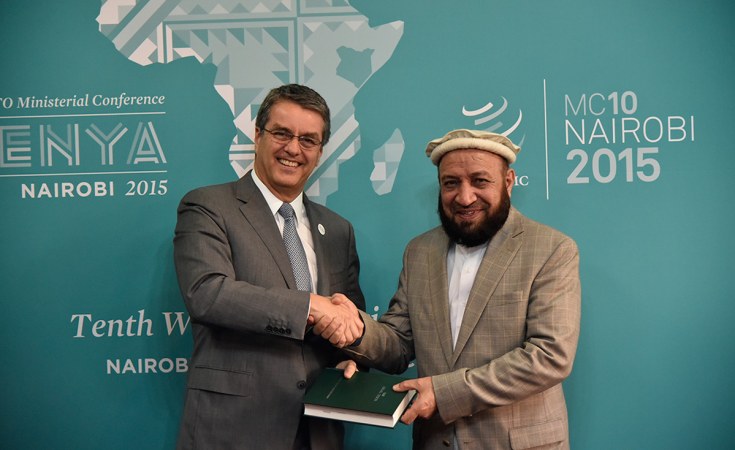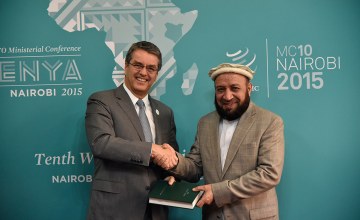The WTO has received six additional ratifications for the Trade Facilitation Agreement (TFA), bringing up to 63 the number of WTO members that have formally accepted the TFA. Several ratifications were submitted by ministers during the organization’s Tenth Ministerial Conference in Nairobi.
U Win Myint, Myanmar’s Union Minister of the Ministry of Commerce, presented his country’s instrument of acceptance to Director-General Roberto Azevêdo in Nairobi on 16 December.
Børge Brende, Norway’s Minister of Foreign Affairs, also handed over his country’s instrument of acceptance to the Director-General on 16 December.
Additional instruments of acceptance were received from Viet Nam and Brunei on 15 December, and from Ukraine and Zambia on 16 December.
Concluded at the WTO’s 2013 Bali Ministerial Conference, the TFA contains provisions for expediting the movement, release and clearance of goods, including goods in transit. It also sets out measures for effective cooperation between customs and other appropriate authorities on trade facilitation and customs compliance issues. It further contains provisions for technical assistance and capacity building in this area.
The TFA will enter into force once two-thirds of the WTO membership has formally accepted the Agreement.
In addition to Myanmar, Norway, Viet Nam, Brunei, Zambia and Ukraine, the following WTO members have also accepted the TFA: Hong Kong China, Singapore, the United States, Mauritius, Malaysia, Japan, Australia, Botswana, Trinidad and Tobago, the Republic of Korea, Nicaragua, Niger, Belize, Switzerland, Chinese Taipei, China, Liechtenstein, Lao PDR, New Zealand, Togo, Thailand, the European Union (on behalf of its 28 member states), the former Yugoslav Republic of Macedonia, Pakistan, Panama, Guyana, Côte d’Ivoire, Grenada, Saint Lucia and Kenya.
The TFA broke new ground for developing and least-developed countries in the way it will be implemented. For the first time in WTO history, the requirement to implement the Agreement was directly linked to the capacity of the country to do so. In addition, the Agreement states that assistance and support should be provided to help them achieve that capacity.
A Trade Facilitation Agreement Facility (TFAF) was also created at the request of developing and least-developed country members to help ensure that they receive the assistance needed to reap the full benefits of the TFA and to support the ultimate goal of full implementation of the new agreement by all members.
Implementation of the WTO Trade Facilitation Agreement (TFA) has the potential to increase global merchandise exports by up to $1 trillion per annum, according to the WTO’s flagship World Trade Report released on 26 October. Significantly, the Report also found that developing countries will benefit significantly from the TFA, capturing more than half of the available gains.
More information on trade facilitation and the TFA can be found at www.wto.org/tradefacilitation. The World Trade Report 2015 is available here.



